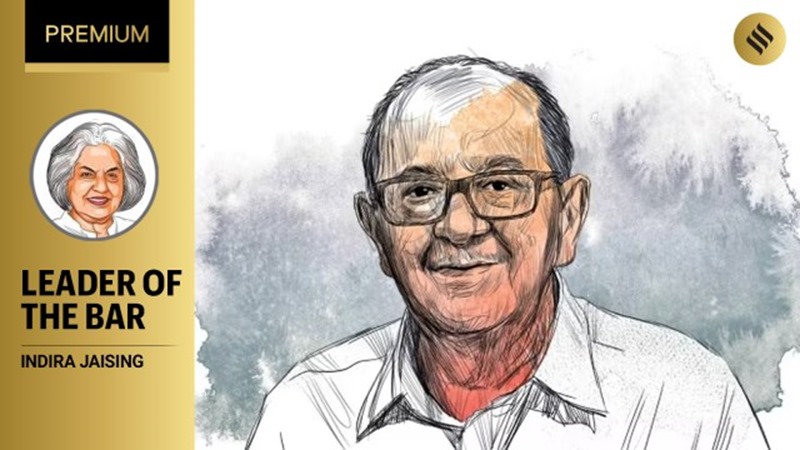Indira Jaising writes: Indian law, after Fali S Nariman
The thinking of generations of lawyers has been shaped by the cases Fali Nariman argued
Written by Indira Jaising | Indian Express
Fali Nariman belonged to a group of illustrious men (notice, no woman in his generation) from the High Court of Bombay, who held high office in the country as law officers.
The passing of Fali S Nariman represents the end of an era. Being 20 years of age when India attained Independence, Nariman belonged to a generation of lawyers who were almost the first post-Independence legal practitioners. On their shoulders fell the task of decolonising a system which worked without a written constitution to one which had a constitution — a transition of immense importance for the citizens of the country. On their shoulders also fell the task of making the first challenges to laws which could be declared unconstitutional.
There were advantages to starting in Bombay. It was the commercial centre of India. Bombay was a city which housed Parsi businesses and industry. There is the famous House of Tatas — known as Bombay House — in which sat another famous Parsi lawyer N A Palkhivala. The legal profession in Bombay, now Mumbai, was proud of being an advisor to the East India Company. At that time, the legal profession was bifurcated between solicitors who did not appear in court and counsels who only appeared in court and did no transactional legal work. Fali Nariman chose the latter and was one of the most sought-after lawyers in his younger days. In a profession dominated by Parsis and Gujaratis, business and industry looked to Nariman for legal advice and guidance. It is in these circumstances that he perfected his command over commercial laws, long before he shifted to Delhi in 1971. He was by then already a role model for generations of lawyers who came after him. The Parsi community has always contributed a judge to the Supreme Court of India, but Nariman chose not to be a judge of any Court. Years later, his son Rohinton Nariman became a judge of the Supreme Court.
Starting work in Bombay as a lawyer, I had several occasions to observe him at work in court. He was, even then, a natural leader of the Bar. Loud and aggressive — which I saw as a mark on his confidence in court — and coming straight to the point, he had a charisma which came from a direct approach to the law. When I started working as a litigator, I often found myself on the opposite side of him. We both belonged to a working-class city which shaped and moulded our work in different ways. He was representing industry, whereas I represented the workers of the enterprises he stood for. Conflict was inevitable, but what it did offer was the opportunity to learn the tools of the trade from a master. His style of practice was minimalist, focused on the outcome his clients wanted. It was a far cry from the days of grandstanding which emerged later in both oral arguments and judgments under the full glare of the media.
Nariman went to the Government Law College in Mumbai to learn the law. It’s a different matter that many who went there say they learnt the law outside the school. With the advent of the national law schools, the nature of legal education has changed dramatically. The march of technology has made legal research available at our fingertips. Yet, ask any young lawyer and you are likely to find that she will know of Nariman’s contribution to the practice of law and has been shaped in her thinking by the cases he argued.
Nariman belonged to a group of illustrious men (notice, no woman in his generation) from the High Court of Bombay, who held high office in the country as law officers. He himself occupied the office of Solicitor General of India under a Congress government. His resignation from the post of Additional Solicitor General on the declaration of Emergency is a testimony to his value system and his commitment to liberalism and democracy.
As a jurist he was committed to the independence of the judiciary. For him, the separation of powers and commitment to judicial review were the cornerstone of a Constitution in defending the rights of citizens against the state. He led the arguments in three major cases which led to the formation of the collegium system, insulating from political interference the appointments of judges to High Courts and the Supreme Court.
State governments and politicians also depended on him for advice. In fact, he represented several states, including Karnataka in inter state water disputes. In a different context, he represented the State of Gujarat in the Narmada rehabilitation case. He also represented the late J Jayalalithaa. He also appeared in the TMA Pai case which held that higher education was a business and occupation entitled to protection as a fundamental right under Article 19(1)(g) of the Constitution of India. He was a liberal and believed in the free market.
In his long career, the one regret he expressed was about this representation of Union Carbide Corporation in the Bhopal Gas leak case on becoming aware of the suffering caused to the victims and the inadequacy of compensation provided in an agreement signed under his watch. But then, how many lawyers even apologise for the consequences of their professional work? I wonder if he also regretted his appearance in the infamous Nargesh Meerza case which denied women air hostesses the right to continue in employment after marriage.
His commitment to secular values cannot be doubted. He spoke up when he saw the slow dismantling of some of the basic features of the Constitution. History will judge the contribution of his generation of lawyers to the making of modern India.

